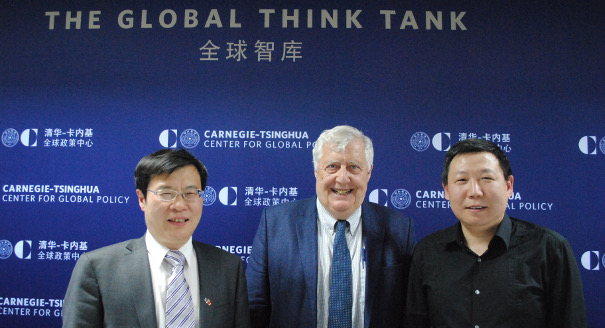Registration
You will receive an email confirming your registration.
Since joining the World Trade Organization fifteen years ago, China has greatly broadened its economic engagement with Europe and other parts of the world. Chinese foreign direct investment (FDI) in Europe has shifted in recent years from natural resources to services and consumer goods in developed market economies. However, asymmetrical market access is a growing concern for the EU, given that Chinese investment in Europe is expanding in economic sectors that are not open to foreign investors in China.
Carnegie–Tsinghua’s Shi Zhiqin moderated a discussion between Xavier Richet and Chen Xin on how Chinese outbound FDI is shaping market conditions in EU member states as well as Chinese firms’ efforts to integrate into global value chains. This event was co-sponsored by the Tsinghua University Sino-French Research Center.
Discussion Highlights
- Steady Growth of Chinese FDI: Panelists attributed the gradual increase in Chinese investment in Europe to a variety of incentive structures, such as the quest for strategic assets—advanced technology, new knowledge, and well-regarded brands—as well as overseas markets in the face of increasingly stiff domestic competition. In a bid to integrate themselves into international value chains, some Chinese firms have also become stakeholders in foreign companies, which allows them to absorb new management practices and industry knowledge. However, participants added, for many Chinese firms, becoming internationally competitive remains an ongoing challenge.
- Stakeholders and Their Objectives: One panelist identified three types of investors that have driven the surge in Chinese investment: state-owned enterprises (SOEs), publically traded corporations, and privately owned small- and medium-sized enterprises. State-owned firms have distinct advantages over private firms in terms of market access, research and development, and financing. According to speakers, SOEs generally enter the market through mergers and acquisitions, seeking strategic assets, such as infrastructure and utilities, key technologies, and natural resources. Corporations are interested in such assets as well, but they are also concerned with integrating into supply chains and acquiring respected brand names.
- Diversifying Investments in Europe: Speakers observed that the majority of regional Chinese investment flows into Western European countries that joined the EU relatively early. In such countries, investors can access larger consumer markets, advanced technology, and favorable currency exchange rates. From 2000 to 2014, over half of cumulative Chinese FDI to Europe targeted France, Germany, and the United Kingdom. Panelists noted, however, that the geographic scope of Chinese investment is slowly diversifying to include new EU member states and countries in the Balkans. According to speakers, these new destinations offer advantages such as lower labor costs, growing markets, and fewer regulations, which make the region well-suited for export manufacturing.
- Investments By Sector: According to speakers, Chinese investment gravitates toward specialized, high-tech industries, although a considerable amount enters the services sector as well. One panelist reported that Chinese investors prioritize energy-related and advanced manufacturing sectors, noting that in recent years they have invested $13 billion in public utilities, fossil fuels, and renewable energy, as well as $6 billion in automobiles and $4 billion in heavy equipment. Meanwhile, Chinese investment has also provided a cumulative $3 billion in high-value-added sectors such as biotechnology and finance. More recently, Chinese investment has increasingly expanded into agricultural production and commercial real estate.
- An Uncertain Future: Speakers asserted that there are compelling economic incentives for China to continue investing heavily in Europe, although countervailing trends may inhibit such growth. One panelist pointed out that more than 60 percent of Chinese exports to the EU are component parts and other types of intermediate goods that are ultimately assembled in Europe. According to speakers, this suggests that China is already integrating into European value chains in ways that could lead to greater future cooperation. However, several panelists expressed concerns that China’s economic downturn is reducing the country’s foreign reserves, which may in turn limit Chinese overseas investments. They also noted that Europe and China have not yet finalized an investment treaty.
Shi Zhiqin
Shi Zhiqin is a resident scholar at the Carnegie–Tsinghua Center for Global Policy, where he runs the China-EU Relations program and the China-NATO dialogue series.
Xavier Richet
Xavier Richet is a professor emeritus of international business at the University of Sorbonne Nouvelle. He is also the co-founder and co-director of the BRICs Seminar at the Fondation Maison des Sciences de l’Homme and the School for Advanced Studies in the Social Sciences in Paris.
Chen Xin
Chen Xin is a researcher in the Institute of European Studies at the Chinese Academy of Social Sciences.
